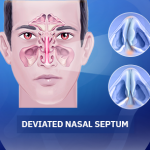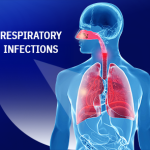Nasal Congestion
Nasal Congestion is a common symptom that affects everyone—from infants to the elderly. While it’s generally not considered a serious condition, it can be more concerning for infants as it causes significant breathing difficulties.
Nasal Congestion, also known as nasal blockage, occurs when the tissues lining the inside of the nose become irritated. This irritation leads to inflammation, swelling, and increased mucus secretion, which makes breathing through the nose difficult.
In this article, you will find everything related to Nasal Congestion, including:
- Causes of Nasal Congestion
- Symptoms of nasal blockage
- Treatment of Nasal Congestion
- Diagnosis of Nasal Congestion
- Guidelines for preventing nasal congestion
- Potential complications
Causes of Nasal Congestion:
Nasal Congestion results from narrowing of the nasal cavity due to several factors, including viral respiratory infections such as:
Influenza
Common cold
Other potential causes of Nasal Congestion include:
Pregnancy
Seasonal allergies
Sinus infections
Nasal polyps
Allergic rhinitis
Side effects from certain medications
Thyroid hormone imbalances
For children, it’s essential to check whether a foreign object is lodged in one nostril, especially if the congestion is only on one side.
Symptoms of Nasal Congestion:
Sometimes, Nasal Congestion is the first sign that the body is fighting off a viral or bacterial infection. Swelling inside the nose is often the reason behind the sensation of congestion. Accompanying symptoms may include:
Snoring
Coughing
Sneezing
Runny nose
Persistent headache
Difficulty sleeping
Trouble feeding in infants
Difficulty breathing through the nose, leading to mouth breathing
Treatment of Nasal Congestion:
If Nasal Congestion lasts for more than 7 days, it’s recommended to consult a doctor. Treatment varies depending on the root cause. Options include:
Drinking a mixture of apple cider vinegar, honey, and warm water
Eating garlic
Inhaling steam
Taking immune-boosting supplements
Nasal rinsing with saline solution
Using prescribed medications
Drinking plenty of water to thin mucus
Sleeping with the head elevated using extra pillows to help drain mucus
Diagnosis of Nasal Congestion:
Diagnosis of Nasal Congestion is done through several methods, including:
Comprehensive blood tests
Physical examination by a physician
Reviewing the patient’s medical history with an ENT specialist
Guidelines for Preventing Nasal Congestion:
To reduce the risk of Nasal Congestion, follow these preventive tips:
Drink warm fluids regularly
Ensure rest and reduce stress
Avoid breathing polluted air
Wash hands frequently with soap and water
Exercise and follow a healthy diet to boost immunity
Clean your nose regularly with saline solution
Frequently wash and disinfect bedding with hot water and antiseptics
Complications of Nasal Congestion:
Nasal Congestion can result from allergies, sinus infections, or other health issues. In most cases, it resolves with home remedies or medications prescribed by a doctor. However, neglecting treatment may lead to complications such as:
Impaired hearing and speech
Dry mouth due to mouth breathing
Sleep disturbances, leading to constant fatigue and exhaustion
Nasal Congestion is a widespread problem that affects many people. If it persists for several days or is accompanied by the symptoms mentioned above, consult an ENT specialist to receive appropriate treatment and regain normal breathing as soon as possible.






